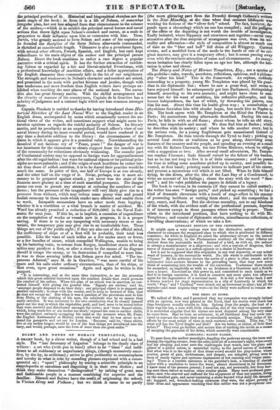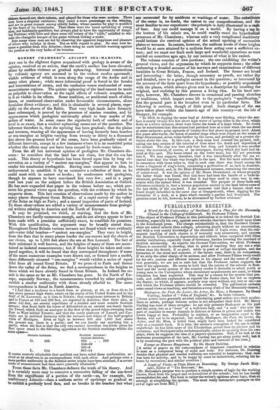DIARY AND NOTES OF HORACE TEMPLETON, ESQ.
A SMART book, by a clever writer, though of a bad school and in a bad style. The "late Secretary of Legation" belongs to the dandy class of writers : a set who (with pen in hand) affect to be " blasé " and indif- ferent to all sublunary or superlunary things, (though excessively sensi- tive, by the by, to-criticism) ; strive to give profundity to commonplaces and novelty to what is trite by sounding phrases expressed with a conse- quential air ; "sport" philosophy by seizing a scientific principle in an enoyclopeedia or catechism and disguising it in -their own diction ; and think they make themselves "distinguished" by talking of great men and fashionable people in a manner combining the superior and the familiar. Disraeli and Bulwer have the credit of originating the school, in Vivian Grey and Pelham; but we think it came to us partly (the more glittering part from the French) through Colburu's writers in the New Monthly, at the time when that eminent bibliopole was working his fictions of -the-" silver -fork " school. The fact, however, de- pends upon a chronology which no one has compiled ; and the pedigree of the effete or the departing is not worth the trouble of investigation. Easily imitated, where -flippancy and smartness met together—never very attractive after the first surprise of strangeness was over, from its un- reality and affectation—the style of composition is almost as much out of date as the " blue and buff" full dress of old Whiggery. Current events, and a modified form of the mode in the hands of one of its ori- ginal masters, may give it a temporary effect ; but it seems passing away even with the extrinsic attraction of name and circumstances. An anony- mous imitation has clearly fallen upon an age too late, although the imi- tation is sober and clever.
The Diary and Notes of Horace Templeton, Esq., are a species of oils podrida—tales, travels, anecdotes, reflections, opinions, and a philoso- phy "after his kind." This is the framework. An orphan, suddenly succeeding to a property, young Mr. Templeton was placed by his guar- dian in the diplomatic line ; where he saw a great deal, and seems to have enjoyed himself: he subsequently got into Parliament, distinguished himsel4 according to his own account; and might have risen to emi- nence but for his want of ambition, his reflective philosophy, and his honest independence, the last of which, by thwarting his patron, cost him his seat. About this time his health gives way ; a consultation of physicians furnishes him with slender hopes, but sends him to Naples to die. The book opens with Mr. Templeton at the HOtel des Princes in Paris; his antecedents being afterwards described. During his rest at Paris, he falls in with an old flame ; about whom he tells an old story, smart, but improbable and unreal. We then find him at Baden ; which he describes with its society; and where he tells another story, but in the serious vein, for a young Englishman gets assassinated instead of Mr. Templeton. Be then travels through the Tyrol to Italy ; picking up several local stories or traditions as he goes along, describing some features of the country and the people, and spending an evening at a small inn with Sir Robert Chaworth, the late Prime Minister, whom he obliges with a suggestion or two. After several small adventures, Mr. Temple- ton reaches Florence; finds himself ruined by the failure of his banker, but as he has not long to live it is of little consequence ; and he passes his time in telling some anecdotes picked up in society, and possibly in- vented, at first hand; printing some letters to indicate part of his career, and -present a mysterious veil which is not lifted. When he feels himself dying, he sits down, after the idea of the Last Day of a Condemned, to write an accountag his feelings; closes the story with the word " fare- well " ; and his valet publishes the papers in default of a legacy.
The book is various in its contents (if they cannot be called matter); the writer has seen " foreign parts," and picked up something ; he has a kind of dramatic cleverness with a touch of stage-effect in his manner of presenting incidents or cutting them short ; and the composition is easy, smart, and fluent. But the obvious unreality, not to say falsehood of the whole, with the evident craft of the professional penman, deprive it of interest except in those passages where writing is proper. These relate to the introduced portions, that have nothing to do with Mr. Templeton ; and consist of' diplomatic stories, miscellaneous reflecliona, travelling observations; of which we take a few.
LITERARY imsnurs OF THE CENSORSHIP.
It might open a very curious view into the distinctive nature of atational character to compare the recognized class to which vice is attributed in different countries; for while in England we select the aristocracy always as the natural subjects for depravity, in the Piedmonterie territory all the stage villains are derived from the mercantile world. Instead of a lord, as with us, the seducer is always a manufacturer or a shipowner; and vice a captain of dragoons, their terror of domestic peace is a cotton-spinner or a dealer in hardware. Let it not be supposed that this originates in any real depravity, or any actual want of honesty, in the mercantile world. No; the -whole is attributable to the "Censor." By his arbitrary dictate the entire of a piece is often recast; and so habituated have authors become to the prevailing taste, that they now never think of occasioning him the trouble of the correction. Tradesman there stands for scoundrel, as implicitly as with us an Irishman is a blunderer and a Scotch- man a knave. Exercised as this power is, and committed to such hands as we find it in foreign countries, it is hard to conceive any more quiet but effectual agent for the degradation of a national taste. It is but a few weeks back I saw a drama marked for stage representation in a city of Lombardy in which the words "Pope" and " Cardinal were struck out as irreverent to utter; but all the appeals—and most impious they were—to the Deity were suffered to remain un- mediated.
THE HERO AT HOME.
We talked of Hofer, and I perceived that my companion was strongly imbued with an opinion, now very general in the Tyrol, that his merits were much lass than foreigners usually ascribe to him. Sprang from the people, the host of a little wayside inn, a man with little education, and of the very roughest manner, it is somewhat singular that his claims are most disputed among the very class he came from. Had he been an aristocrat, in all likelihood they had never ven- tured to canvass the merits they now so mercilessly arraign. They judge of his efforts by the most unfair of tests in such matters—the result. They say, "To what end has the Tyrol fought and bled? Are we better, or richer, or freer than before?" They even go further, and accuse him of exciting the revolt as a means of escaping the payment of his debts, which assuredly were considerable.
DAMBLING: BADEN BADEN.
To pass from the mellow moonlight, dappling the pathway among the trees and kissing the rippling stream, from the calm, mild air of a summer's night, when every leaf lay sleeping and none save the nightingale kept watch, into the glare and glitter of a gilded saloon is somewhat trying to the jarred nerves of sickness. But what was it to the sight of that dense crowd around the play-tables, where avarice, greed of gain, recklessness, and despair, are mingled, giving even to faces of manly vigour and openness expressions of low cunniruz and vulgar mean- ing? There is a terrible sameness in the gambler's look, a blending of slavish terror with a resolution to brave the worst, almost demoniacal in its fierceness. I knew most of the persons present; I need not say, not personally, but from hav- ing seen them before at various other similar places. Many were professed gam- blers; men who starved and suffered for the enjoyment of that one passion, living on the smallest gain, and never venturing a stake beyond what daily life demand- ed: haggard, sad, wretched-looking creatures they were, the abject poverty of their dress and appearance vouching that this metier was not a prosperous one. others &need out their talents, and played for those who were novices. These men have a singular existence; they exact a mere percentage on the winning, and are in great request among elderly ladies, whose passion for play is modified by the fears of its vicissitudes. Then there were the usual sprinkling of young men, not habitually gamblers, but always glad to have the opportunity of tempt- ing Fortune; with here and there some old votary of the "table," satisfied to wit- ness the changeful temper of the game without risking a stake.
Into many vices men are led by observing the apparent happiness and pleasure of others who indulge in them. Not so with regard to play. No man ever be- came a gambler from this delusion; there being no such terrible warning against the passion as the very looks of its votaries.



























 Previous page
Previous page